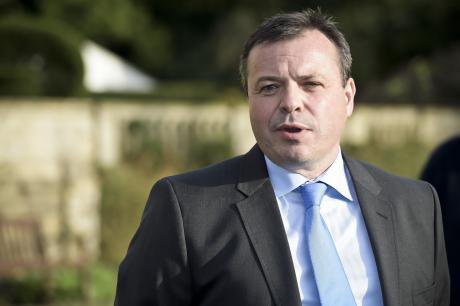
Arron Banks in 2014, when he pledged £1million to the UK Independence Party. Ben Birchall/PA Images. All rights reserved.
In September 2013, the man who bought Brexit – Arron Banks – was in trouble.
For the past two years, financial regulators in Gibraltar had been scrutinising his insurance under-writer, Southern Rock. They had discovered it was keeping reserves far below what was needed.
This was a serious problem. Banks claimed he had already provided £40 million to plug the hole. He also told the regulator he would step down as a director, but has since been required to find an eye-watering £60 million in extra funding.
A year later, these financial worries seem to have completely evaporated. Banks had begun buying diamond mines, investing millions into chemical companies and wealth management firms, setting up loss-making political consultancies, and most famous of all – funding the United Kingdom Independence Party (UKIP).
One question remains though. If Banks was in such a tight spot in September 2013, how did he manage to be so generous the following year?
Over the past four months, openDemocracy has conducted an in-depth review of Bank's business dealings since he first started out in business in the early 2000s. As well as his own public statements about the sources of his wealth, we have spoken to his former employers, and obtained and reviewed court documents. There are of course a number of perfectly innocent ways that Banks could have obtained the extra funds, but given Banks’ significance to British politics, what we have found so far is extremely troubling.
“Quite good at persuading people to buy things they didn’t want to buy”
Banks had started out selling vacuum cleaner appliances door to door in Basingstoke in the late 1980s. “I was quite good at persuading people to buy things they didn’t want to buy,” he told the New Statesman in October 2016. He also briefly worked as an estate agent, and ran a failed bid to become a Conservative councillor. He married young and was soon the father of two daughters.
After leaving school with few qualifications, he had eventually found himself in a junior position in the Lloyds' insurance market. This is where Banks gained his first exposure to the industry, where syndicates of insurers spread risks between themselves and traded financial assets to cover their positions. Banks spent seven years at Lloyds', working his way into a junior underwriting position before he moved to Bristol, following a split from his first wife.
If Banks was in such a tight spot in September 2013, how did he manage to be so generous the following year?
It is here the cracks in Banks’ biography start to appear. Banks has claimed he was promoted and rose to lead his own sales team at Norwich Union – now part of Aviva. However, Aviva say they have no record of Banks ever having worked for Norwich Union. He has also claimed to have worked for Warren Buffett around this point in his career. We asked Buffett about this. He replied. "I have no memory of ever hearing of the name Arron Fraser Andrew Banks. He certainly never worked for me." Further checks across the Berkshire Hathaway group, made by Buffett’s office, yielded no evidence he had ever worked for any of his subsidiaries. In a letter delivered by his lawyers, Banks declined to comment on either of these points.
In 1998, Banks got taken on by a tiny broker focussed on motorcycle insurance run from offices above a shop in the sleepy village of Thornbury. He was granted a 20% shareholding in the fledgling business. In November 2000, he resigned as a director of the firm, and two months later, sold his shares for £251,000.
Shortly afterwards, Banks met the woman who was to become his second wife, a Portsmouth-based Russian called Ekaterina Paderina. According to the Sunday Times, Paderina’s former husband had been interviewed twice by Special Branch because they suspected her of working for the Russian government. Ekaterina moved to join Banks in Bristol but stayed on the electoral roll in Portsmouth until 2008, still registered to a council flat overlooking the naval base. When Portsmouth Council found out she should not have been entitled to the flat because she was living with Banks, council officials reportedly demanded a cash payment be made by the Banks family in recompense.
Banks and Ekaterina wed in 2001 and in the autumn of that year Banks set up his own insurance company, with financial backing from his relatives and from the Northern Irish insurance tycoons, Leslie Hughes and James Bowers. The business focused on motorcycle, motorhome and van insurance.
The new businesses were also the first he formed with two men who would become his long term business partners, the Australian solicitor Jim Gannon and the accountant Paul Chase-Gardener.
In June this year, the Financial Times published their own analysis of the overlapping businesses of Arron Banks, the “Bad Boy of Brexit”, and its editor Lionel Barber quite reasonably asked on Twitter: “but how rich is he really?”.
Banks fumed in a tweeted reply: “I founded and sold a listed insurance business for £145m! Not even mentioned – no FT, fake news.” That listed company was Brightside.
The amounts Banks has given to British politics are extraordinary.
The amount Banks made from the sale of Brightside is crucial to understanding whether Banks is really as rich as he says he is.
Company documents we have reviewed show Banks made £22 million from share sales, £1.2 million in salary from serving as the group’s CEO and Chief Insurance Officer, and just £270,000 in dividends.
So when Banks had told the Financial Times in 2015 he was worth £100 million, where did this valuation come from? More importantly, if he only made £22 million from Brightside share sales – where did all this cash for Brexit campaigning come from?
The amounts Banks has given to British politics are extraordinary. A total of £6 million in loans, still outstanding, was made to Leave.EU. He famously pledged £1 million to UKIP in 2014, at a time when the organisation’s finances were stalling. Without Banks, the political potency of the party may well have fizzled out. In 2016, his company, Better for the Country Ltd, also bought almost £2 million in pro-Brexit merchandise and donated it to Grassroots Out, another Brexit campaigning group. In total, his political contributions have come to nearly £10 million.
That would mean he might have given away almost half of what he made from Brightside to political causes. That seems amazingly generous.
“Serious and widespread failings”
As his own tweeted rebuke of the Financial Times suggested, central to the Banks mythology is the sale of Brightside Plc. in 2014. The buyer was private equity firm Anacap. Although he tweeted that the sale had been for £145 million, it was reported at the time as being worth only £127 million. How much, though, did Banks get?
The story starts in 2001 when Banks set up Group Direct, which was the principal operating company for his insurance brand Commercial Vehicle Direct. Group Direct made losses of over £400,000 in its first two years of operation, before finally turning a profit in 2004.
By 2006, overall debts had increased to £34 million, but the group appeared to be growing strongly, with turnover of £20 million. Banks began to aim for a public listing of the group. The same year, he became a director of Brightside, at that time a recently formed debt management service aimed at the personal insolvency market. Crucially, Brightside was already listed on AIM, the junior stock exchange.
In June 2008, the original Banks insurance group took part in a transaction known as a ‘reverse takeover’, in which a listed company takes over a much larger unlisted company. This allows the unlisted company to obtain a listing on a stock exchange quicker than usual. Under the terms of the deal, Brightside duly bought the three companies which constituted Group Direct. The £50 million valuation put on these companies seemed high but the deal did not boost Banks’ bank account – as the consideration for the deal was in Brightside shares.
Then, in 2008, the financial crisis hit. As with many businesses, Banks’ lending facilities came under pressure. But Banks was still able to raise money from Brightside’s shareholders: in 2009 and 2010 the company raised a total of £29 million, attracting investors with its eye-catching growth rate and ambitious plans to acquire other companies.
Two of the assets Banks’ firm acquired were the little-known insurance brands "E-Car" and "E-Bike." The price was an initial £15.5 million, with £19.1 million deferred, based on future profitability.
In fact, both brands were owned by Southern Rock Insurance, a company of which Banks, Gannon and Chase-Gardener collectively owned 72%.
Two other companies, "E Systems" and “E Development” were bought for a further £17 million in 2011. At the time E Development had net liabilities of over £500,000. E-systems had been set up just months before the sale by Banks, and Brightside IT director Simon Jones. It had no other customers than Brightside.
These acquisitions seem hard to justify, but in documents sent to Brightside shareholders notifying them of the proposed purchase of E-Systems and E-Development, the company stated that they had received undertakings from Banks and his fellow directors that the funds would be used to shore up the firms under-writer, Southern Rock, and thus allow Brightside to continue trading. And this is, indeed, what happened.
However, within the year Banks was fired from his role at Brightside. He famously recounted how he punched his partner and friend, Jim Gannon, in the face, when the solicitor broke the news to him.
Banks remained a shareholder in Brightside and in 2013, sold a tranche of his shares for £6 million to a competitor, Markerstudy, which was said to be contemplating a bid for the company. After conducting due diligence and negotiating with the Brightside board however, Markerstudy declined to make a full bid, with their CEO describing Brightside as “over-valued”.
In 2014, the investment firm Anacap arrived and thought differently. They bought Brightside in its entirety, paying £127 million to take control.
Anacap have since alleged in court that the new management team discovered “serious and widespread failings” throughout the company, many dating from Banks’ time as CEO and Chief Insurance Officer. All of the purchases of Banks' companies (E-Car, E-Bike, E-Systems, and E Development) were confirmed to be worth far less than had been paid for them. The software supplied by E-systems was said to barely function and the Brightside website was hacked and remained inoperable for over a month. Court documents obtained during our investigation allege widespread failings, including an incendiary allegation that the company was “in breach of its banking covenants and insolvent on a net asset basis.” There were also, according to the same documents, no correct systems in place for the handling of client funds.
All of the purchases of Banks' companies were confirmed to be worth far less than had been paid for them.
For an insurance company, this was a particularly serious problem. Anacap replaced several senior staff and board members including the CFO, Paul Chase-Gardener. Over £35 million of value had to be written off from the Brightside balance sheet, in part because Anacap deemed the E-Car, E-Bike, E-Systems and E-Development purchases had been grossly overvalued. Within a year of the takeover, the new owners also had to plough in an additional £40 million to prevent the business from going bust. Further large write downs were made in 2015. Court documents show that £12 million had to be inserted in a failed attempt to repair the IT system alone, with numerous other consultants brought in to clear up the problems the new owners found.
openDemocracy asked Banks to comment on Anacap’s view of the value of these businesses. He declined to reply to our specific questions, instead sending a copy of a letter which his lawyers wrote to the BBC in May of this year. In this letter his lawyers say: “The offer from Anacap to acquire Brightside was announced in May 2014 nearly two years after Mr Banks had left the company.”
In 2016, Anacap began legal action against Chase-Gardener and Brightside’s auditors for failures to adequately manage the business and present accurate financial reports. With the assistance of his brother Jonathan, a Hong Kong based lawyer, Banks was able to settle out of court in May 2015. Privately, many of the new senior management team brought in by Anacap wanted to pursue the case against him. As part of their settlement with Banks, Anacap were able to extricate Brightside from contracts with other Banks controlled businesses, such as Southern Rock, which they described as “onerous.” The case against Chase-Gardener is still being pursued in the High Court, where Anacap are seeking £20 million in damages from him. The auditors, Baker Tilley, (now part of RMS Tenon), are facing a claim of around £50 million.
Southern Rock in difficulty
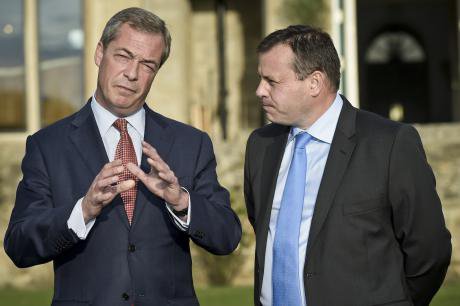
Arron Banks with former UKIP leader Nigel Farage. Ben Birchall/PA Images. All rights reserved.While at Brightside, Banks had been able to partly re-finance the ailing Southern Rock, through buying E-Cars, E-Systems, E-Development and E-Bike from the Gibraltar based group. But the Gibraltar Financial Services Commission had also passed their report to the Financial Conduct Authority in London for review.
The authorities in London concurred with the Gibraltar regulator’s findings, that Southern Rock had been trading without sufficient reserves, and in 2013 Banks voluntarily recused himself from the FCA register. He stepped down as a director of Southern Rock in 2014. Both regulators had effectively barred him from holding a position of control within an insurance business.
He also had to balance the books. While the funds from the sale of E-systems and E-development were passed to Southern Rock, this still left the business short of the capital needed to fund its loss reserves as the company struggled with high claim levels and a challenging market. He told Private Eye he had agreed to find £40 million to re-capitalise the business. Banks claims that Southern Rock is now a profitable company. The letter from his lawyers to the BBC, forwarded to openDemocracy, says “Southern Rock Insurance Company Limited recorded a profit of £42 million in its latest set of filed accounts (2015).”
Banks frequently boasts about running an insurance business. The reality is that he is not permitted, at the moment, to run his own insurance company.
In fact, the accounts show an underlying loss of £27.9 million on its underwriting and insurance activities in 2015 – and while the company did report a profit of £41.5 million overall, this came only after selling the rights to the "ancillary income" on its motor insurance policies for £17.5 million, and the rights to the "finance arrangement fees” for £60.2 million to another company owned by Banks, Isle of Man-based ICS Risk Solutions. Ancillary income is an umbrella term for any money an insurance company makes on top of ordinary under-writing risks, for example from instalments or administration charges.
Given Southern Rock had only written 197,000 motor insurance policies at this time, paying nearly £78m for these rights seemed a high valuation. These assets had also not been recorded in the Southern Rock balance sheet prior to their sale, and resulted in the company booking a large capital gain. Crucially, it was the value of these sales that enabled Southern Rock to meet its obligation under the solvency regulations, and post a profit in its accounts for this year.
Whether Southern Rock will be able to do the same next year, which will likely be required under the terms of capital restructuring deal mandated by the regulators, is unclear. Banks strongly contests the assertion that Southern Rock is in difficulty, pointing out that the Gibraltar regulator, Southern Rock’s independent auditors and the London-based Financial Conduct Authority have approved the arrangements, and that all the payments to date from ICS Risk Solution, which Southern Rock relies on to remain solvent, have been made on time and in full. The letter from his lawyers states: “The future solvency of [Southern Rock] is not dependent on any particular future transaction.”
As for the regulators’ demand that Banks “voluntarily” recuse himself, he has abided by the ruling, but appointed his Hong Kong-based brother in his stead. His name and signature still appeared on a 2014 annual report filed at Companies House, where he was named as a “director.” “This mistake arose from an administrative error,” he told us in a written statement, “which was corrected as soon as it was detected. Once the error was noted, the accounts were withdrawn and resubmitted to Companies House.” He continues to control Southern Rock and Eldon Insurance, owner of the GoSkippy brand, through his holding company ICS Risk Solutions.
Banks frequently boasts about running an insurance business. The reality is that he is not permitted, at the moment, to run his own insurance company. A letter from the Financial Conduct Authority concerning the investigation into his insurance activities, dated 17th July 2017, states that “Mr Banks does not have FCA approval to carry out an operational executive role at Eldon Insurance Services Ltd,” his new firm.
Banks’s Isle of Man-based ICS Risk Solutions is a curious organisation too. In theory, this is the ultimate holding company for Banks’s insurance empire. Yet according to a source with good knowledge of its finances, ICS Risk Solutions has just £1 million in assets, and still owes £60.2 million in monthly instalments, to Southern Rock. These payments are expected to continue until December 2020. A letter from Banks’ lawyers confirming this also said “there is no reason to doubt that the remaining outstanding amounts will be paid in full and on time,” and that Southern Rock is required to report monthly to the Gibraltar authorities, “to confirm the payment of each monthly instalment,” and so “any failure to pay would be immediately apparent.”
Banks’ present financial status is then somewhat unclear, and sometimes dependent on buying assets from one company, in order to shore up another company he himself holds a stake in. But it does seem clear that his claimed worth of £100 million is hard to justify. In the letter sent to openDemocracy, Banks claimed his worth could be even higher than £100 million, saying that he would “broadly agree” with an analysis made by the Sunday Times Rich Times list that his net worth could instead be some £250 million. When asked to explain how he accounts for all this extra wealth, Banks declined to comment.
A Lazarus-like recovery
Banks’s finances seem to have had a remarkable recovery in early 2014. But based on a full review of all the publicly available information about his companies, it is unclear where this money could have come from.
He first had to settle a tax bill with HMRC for £1.86 million, a cheque which he subsequently sent to the Guardian newspaper to prove he was paying his taxes.
In April 2014, the MailOnline reported how Banks had raised eyebrows when he bought £2 million of shares in an AIM-listed chemicals company called Iofina – a sector he had shown no prior interest in. The company produces iodine in an industrial process which takes place alongside fracking. It had never turned a profit and swallowed up large amounts of capital as chemical prices shrank due to reduced demand. Banks’s investment is nursing a huge loss.
In June 2014, he set up Chartwell Political, a PR company which would go on to work on the Leave campaign with Jim Pryor, a former Tory party spokesman who had also worked on FW deClerk’s campaign against Nelson Mandela in South Africa and former Sunday Mirror editor Bridget Rowe, a close friend of Nigel Farage. The company would rack up losses of over £300,000 by June 2015.
Banks would go on to spend a total of £9.6 million of his personal fortune funding the organisations which arguably clinched Brexit. This accounted then for half of his lifetime earnings.
The next month, in July 2014, Banks bought more shares in STM Group plc, which offers "wealth preservation solutions," and specialises in setting up offshore trusts and companies. He bought over £600,000 worth of shares – on top of an existing shareholding. This brought his total share value up to £1.5 million.
By September 2014, Banks had also bought a loss-making, family-run jewellery shop in Bristol, for an undisclosed sum, and lent the firm some £200,000, and by February 2015 he was the owner of four diamond mines in South Africa.
The diamond market had fallen sharply since the financial crash and big players, such as de Beers, began to withdraw from older mines picked clean and requiring huge investment to return to profitable production. Many of these mines had changed hands several times in the years since. One of the mines Banks picked up had collapsed in value from a reported £12 million valuation in 2005, to as little as £200,000 by the time Banks bought.
One of the four mines also remains closed, according to Banks’s website, another contains just “tailings,” meaning there little more than piles of waste to scrabble through. What exactly motivated Banks to buy these mines remains unclear.
Crucially, October 2014 also marked the time Banks began his extraordinarily lavish political spending campaign, with his first £1 million pledge to the United Kingdom Independence Party. Interestingly, Banks never came fully good on this promise – dripping in just over £400,000 in cash instalments over the next six months. Nevertheless, Banks’s 2014 spending alone, or what can be seen of it from publicly available records, came to an estimated £5 million. This was a very large sum given the pressure he was under from the Gibraltar regulators. We also estimate it to be just under a quarter of his total gross earnings of £22m – from his various businesses – since 2001.
Nor did his political spending slow down. Banks would go on to spend a total of £9.6 million of his personal fortune funding the organisations which arguably clinched Brexit: Leave.EU, UKIP and Better for the Country Ltd (set up by STM Fidecs). This accounted then for half of his lifetime earnings – an amazingly generous amount.
One of his most lavish donations was some £2 million to Grassroots Out via Better for the Country Ltd, which was categorised to the Electoral Commission as “non-cash” – a designation usually reserved for the provision of office space or in-kind services to political parties. In reality, even this “non-cash” donation cost Banks significant amounts of hard cash. In a letter to openDemocracy, Banks’ lawyers say Better for the Country bought “merchandise, leaflets, billboards, pens, badges and other paraphernalia,” before donating all of this to Grassroots Out.
In early 2016, he used Better for the Country to make cash donations to Trade Unionists Against the European Union, and another pro-Brexit group called Veterans for Britain. Banks also provided £100,000 to Martin Durkin, a climate change sceptic and producer of “Brexit: The Movie,” a controversial online documentary produced to support the campaign. The sum was equivalent to a third of the documentary’s reported budget.
These donations were all the more remarkable because his new insurance company, founded after Banks left Brightside, was now also requiring large amounts of investment, according to industry experts. Eldon Insurance achieved a profit of just £281,000 on a turnover of £33.6 million in 2015.
Earlier this year, Banks attempted a £200m fundraising effort for Eldon, according to the Times, but was unable to raise the finance from City investors and abandoned the listing. Profits fell further in 2016, to just £165,000. Earlier this month, Banks announced he was attempting a second public listing, and aiming for a valuation of some £250m. He claims to be forecasting a dramatic increase in profits – anywhere between £25m and £28m for the year. To support this claim he provided the Mail on Sunday with unpublished figures showing the profits for the first six months of the year. We asked for a copy of these, but his spokesperson did not respond.
To drum up business, Banks’ insurance brand GoSkippy now advertises heavily on Leave.EU's websites, social media and email marketing. However there are numerous reports of poor customer service, onerous terms obfuscated in confusing small-print and administrative failings by the company, some of which have left motorists unaware that they were no longer insured. In response, Banks commented that “Eldon works very hard on complaints and actively reviews its processes off the back of both internal and external audits of both customer service quality and compliance with regularity requirements,” saying their main brand GoSkippy had complaint levels below 3 per 1000 customers, and that a maximum of 4 per 1000 was the industry guideline.
Southern Rock, despite its difficulties both before and after the regulators’ intervention, has until very recently been the principal under-writer of both Banks’ Go Skippy brand and the Debenhams Insurance brand. The letter from Banks’ lawyers points out that the recapitalisation plan designed to allow Southern Rock to meet its solvency obligations were approved by the regulator and the company’s independent auditors and that they have a perfect record of delivering their monthly payments to date on time and in full.
It is clear, however, that the company only posted a profit last year by relying on the £60 million generated from selling rights to other companies controlled by Banks. To continue to trade on a solvent basis in the years to come, Southern Rock will need to have a profitable underlying business, or have additional cash injections.
And Banks’ own Eldon Insurance, which owns GoSkippy, now plans to move its business from Southern Rock – instead setting up a “managing general agent” called Somerset Bridge, which will be arranging under-writing services from a different Gibraltarian under-writer, backed by a Bermuda-based reinsurer.
The fabric of our democracy
Interestingly, our review of Banks' business empire also shows a huge cross-over between the key figures in Leave.EU and Banks’ businesses. Leave.EU’s Chief Executive Officer Liz Bilney serves on the board of numerous Banks’ companies.
Leave.EU’s director of communications, the Belizean diplomat and close associate of Lord Ashcroft, Andy Wigmore, was appointed to the board of Southern Rock in 2014 and joined Eldon Insurance in December 2015, despite having no background within the industry.
Crucial to maintaining the fabric of democracy in Britain is understanding where large donors have made their money, and just as importantly, how.
Banks holds a substantial share in Manx Financial, an Isle of Man banking group controlled by Leave.EU’s early backer and co-founder Jim Mellon. The meagre profits of Manx Financial have not yet provided dividends to its investors – including Banks.
Crucial to maintaining the fabric of democracy in Britain is understanding where large donors have made their money, and just as importantly, how.
Our review of the publicly available records for Banks’ business empire, and his own public statements, has revealed a patchwork of legal disputes, regulator interventions, and poor corporate governance. Two of Banks’ claimed previous employers have denied he ever worked for them. The value of his businesses are materially lower than Banks’ own inflated boasts and, while still a wealthy man, was he wealthy enough to give so much to the Brexit campaign, without some other undisclosed source of income?
How Banks could afford to give so lavishly remains a mystery. There is no doubt that Banks did more than most to make Brexit happen – the question is, how could he afford it?
This is day four of openDemoracy's #BrexitDarkMoney series. See our reasons for publishing the series, coverage from day one and day two, and day four.
Read more
Get our weekly email
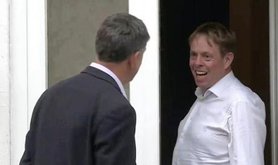
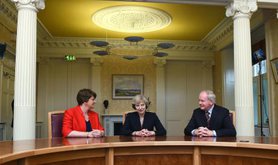

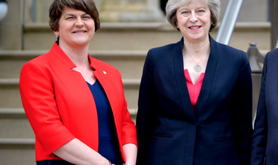
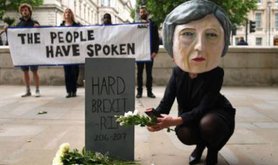
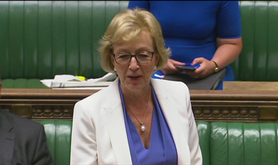
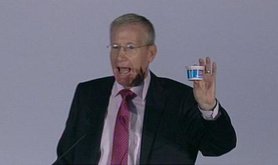
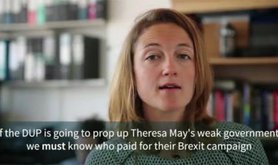
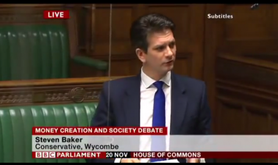
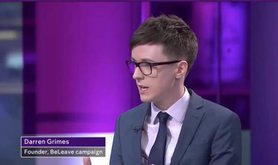
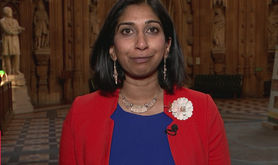
Comments
We encourage anyone to comment, please consult the oD commenting guidelines if you have any questions.